Diary of Trooper Ion Llewellyn Idriess-1916-1917- Part 2
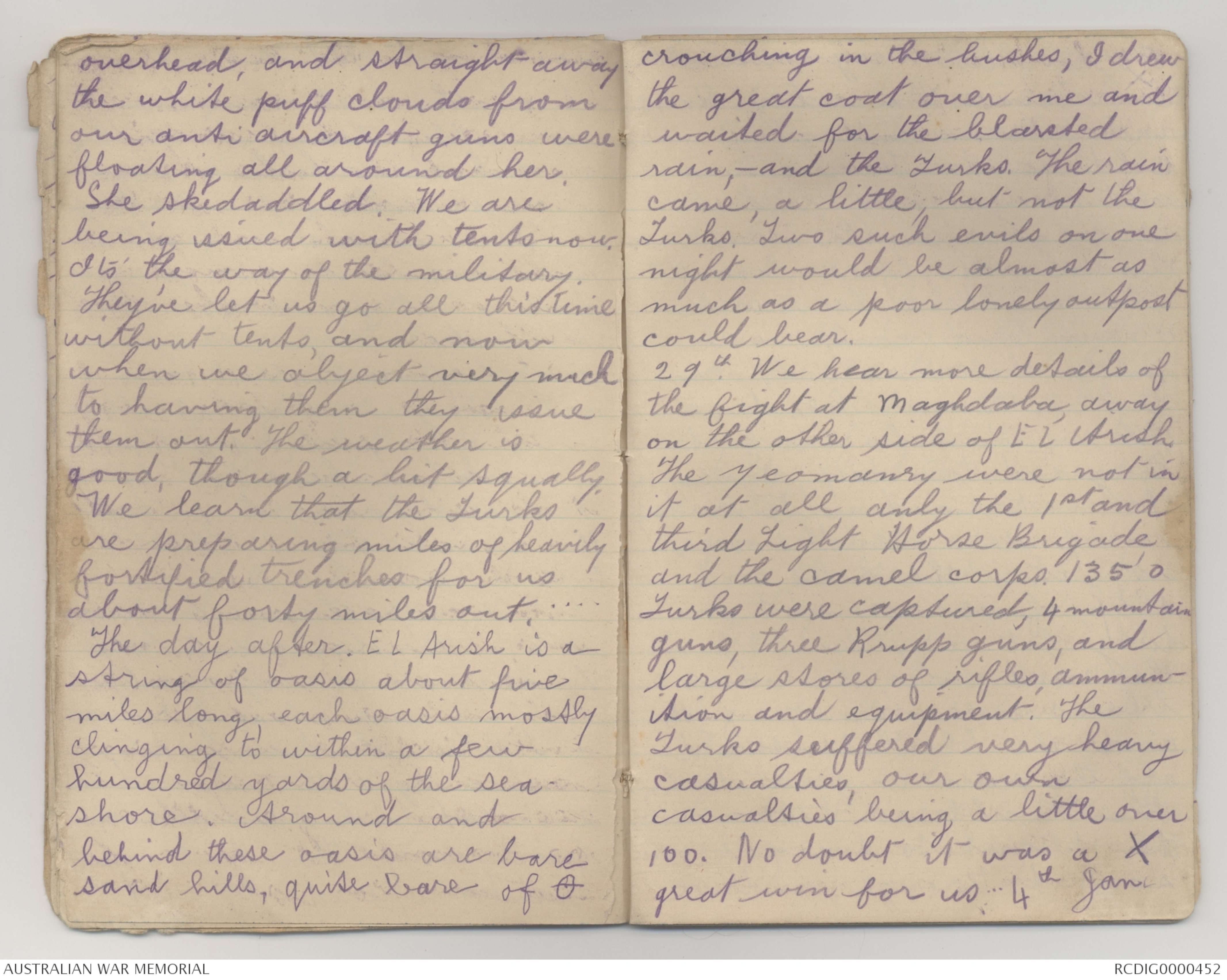
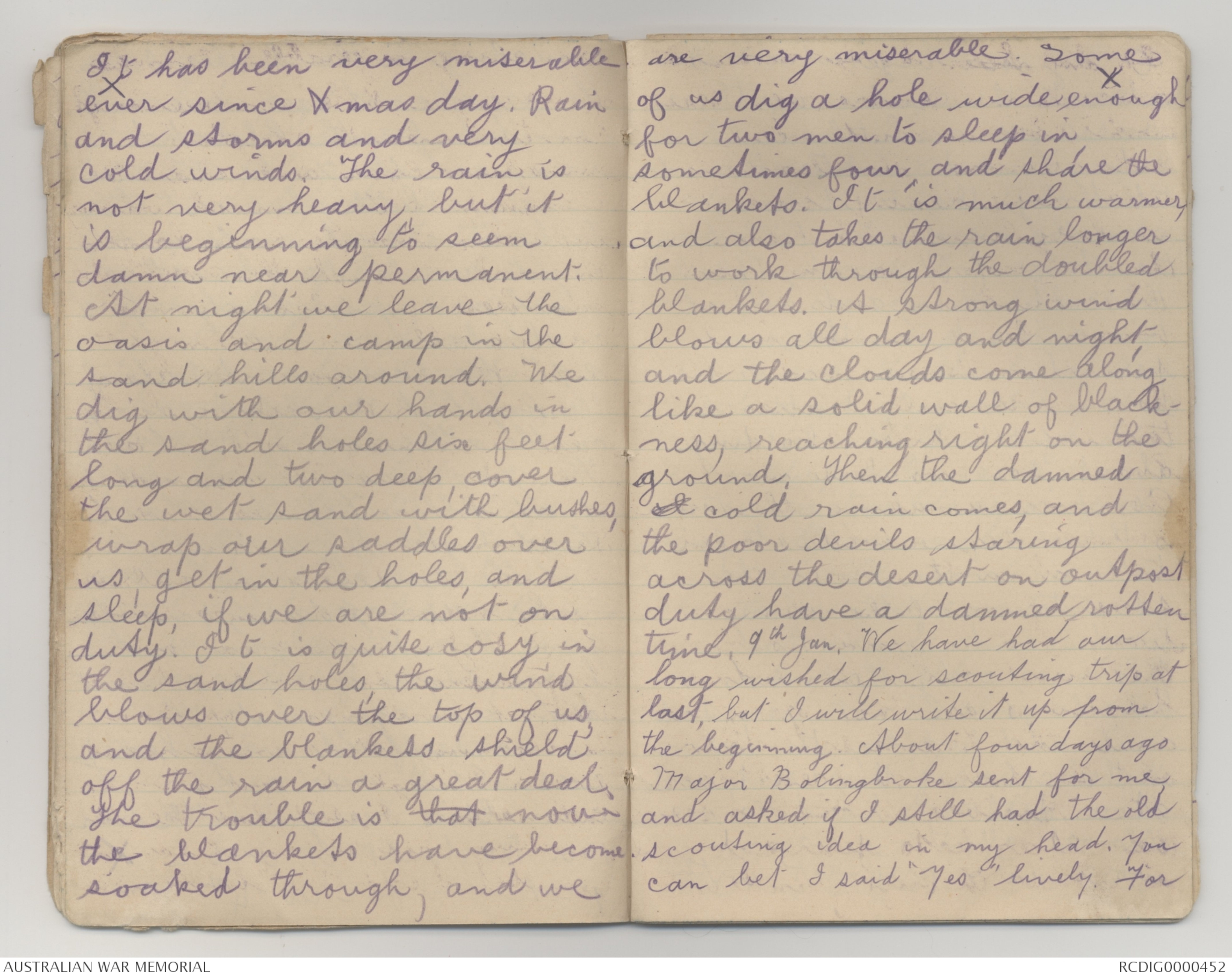
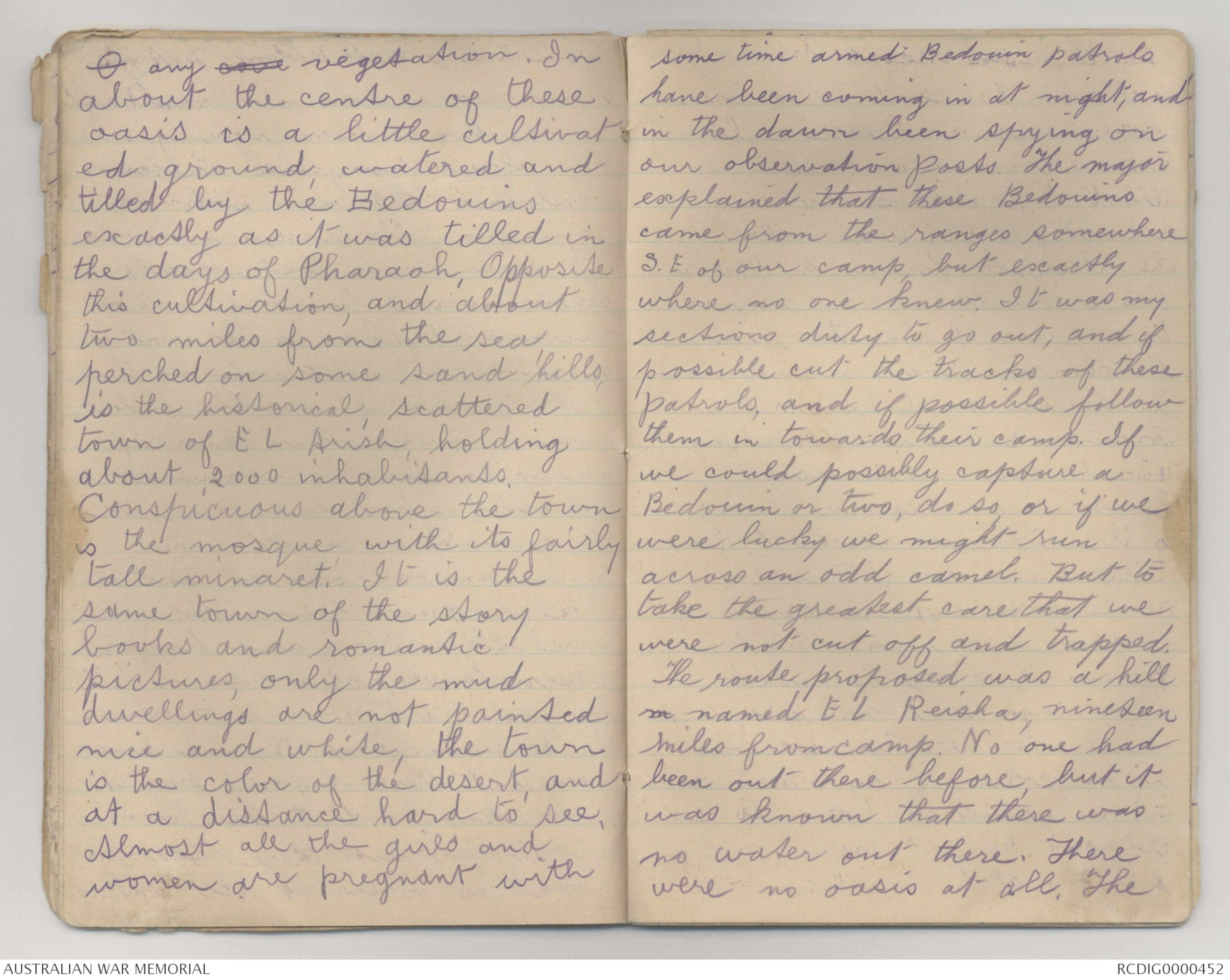
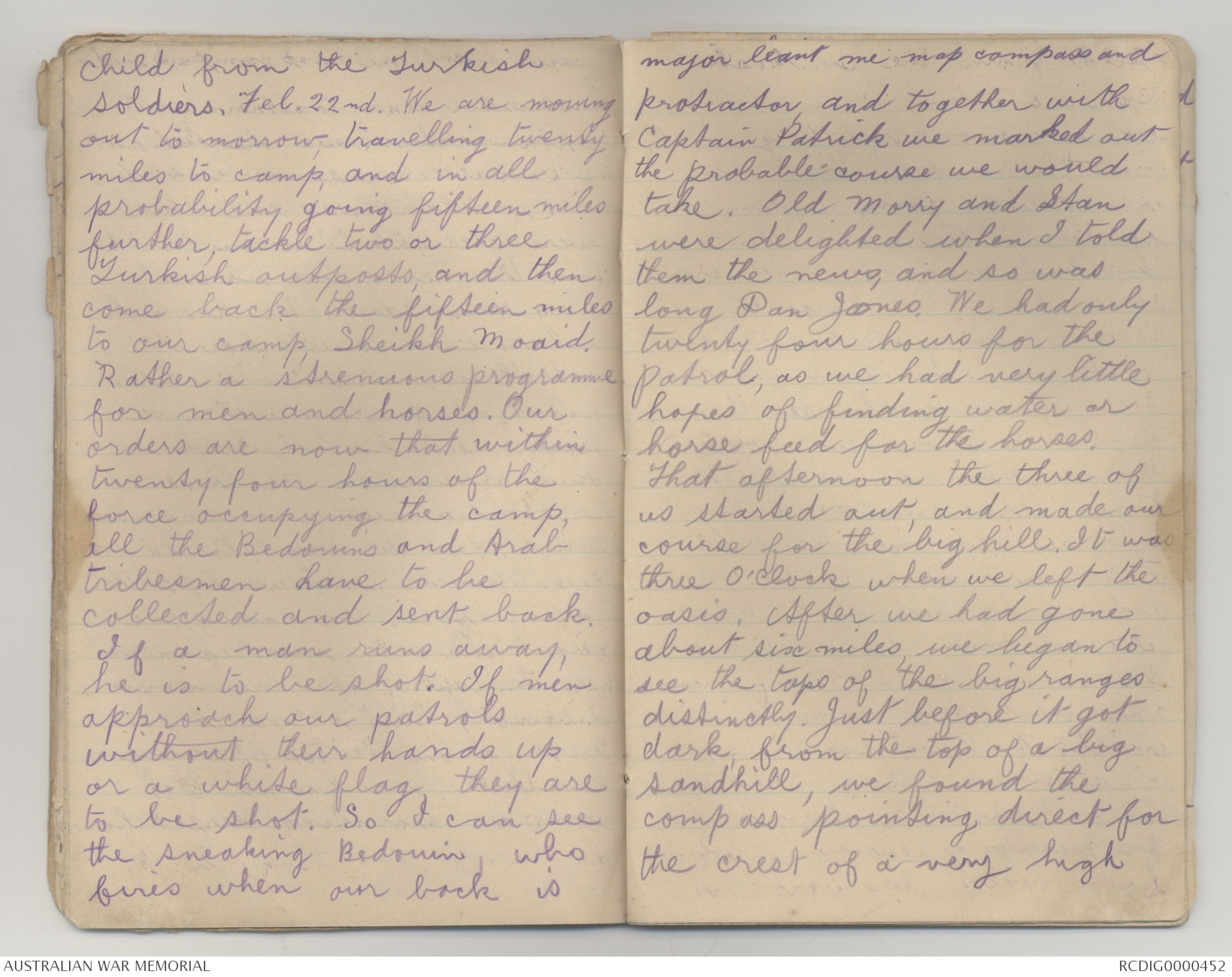
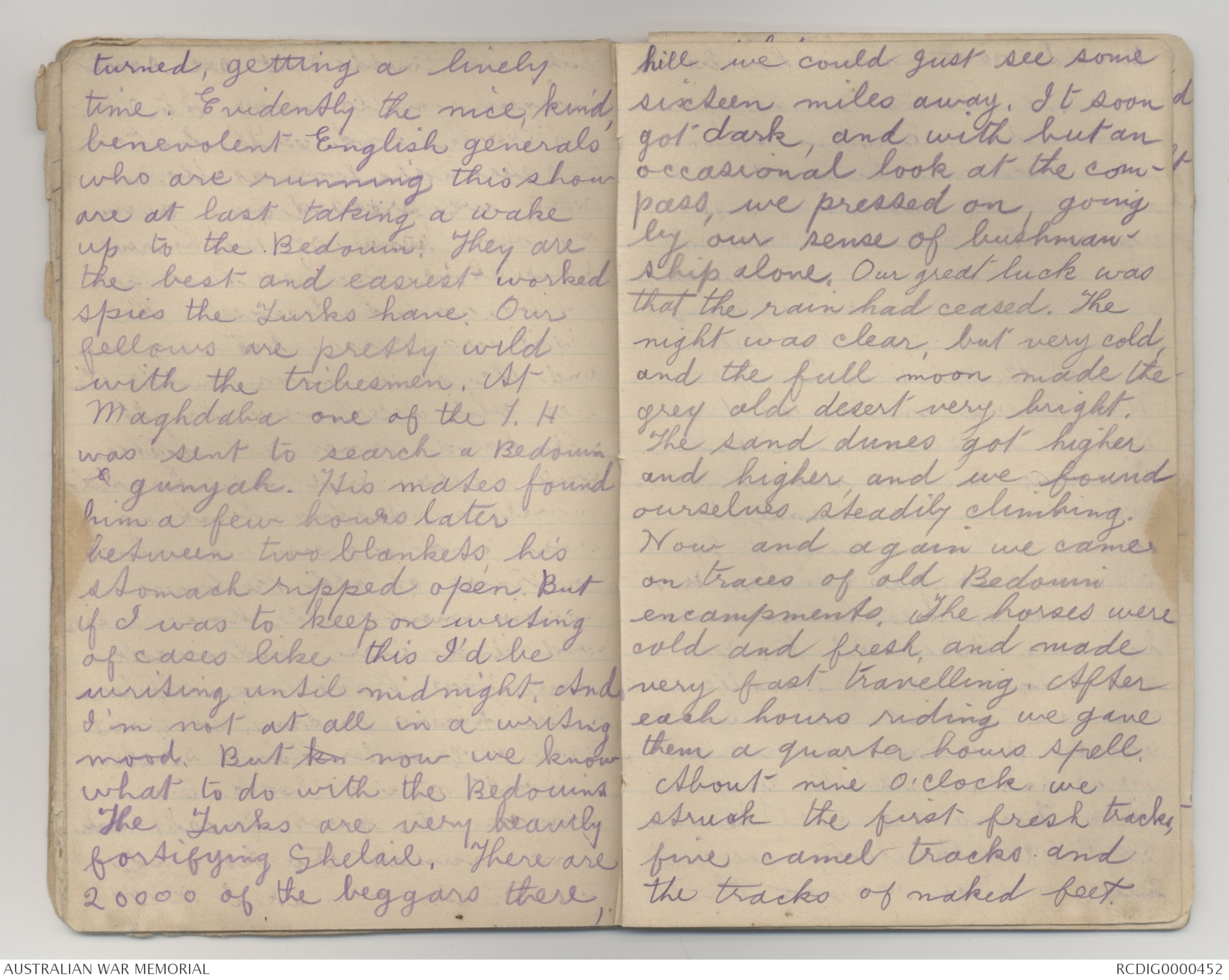
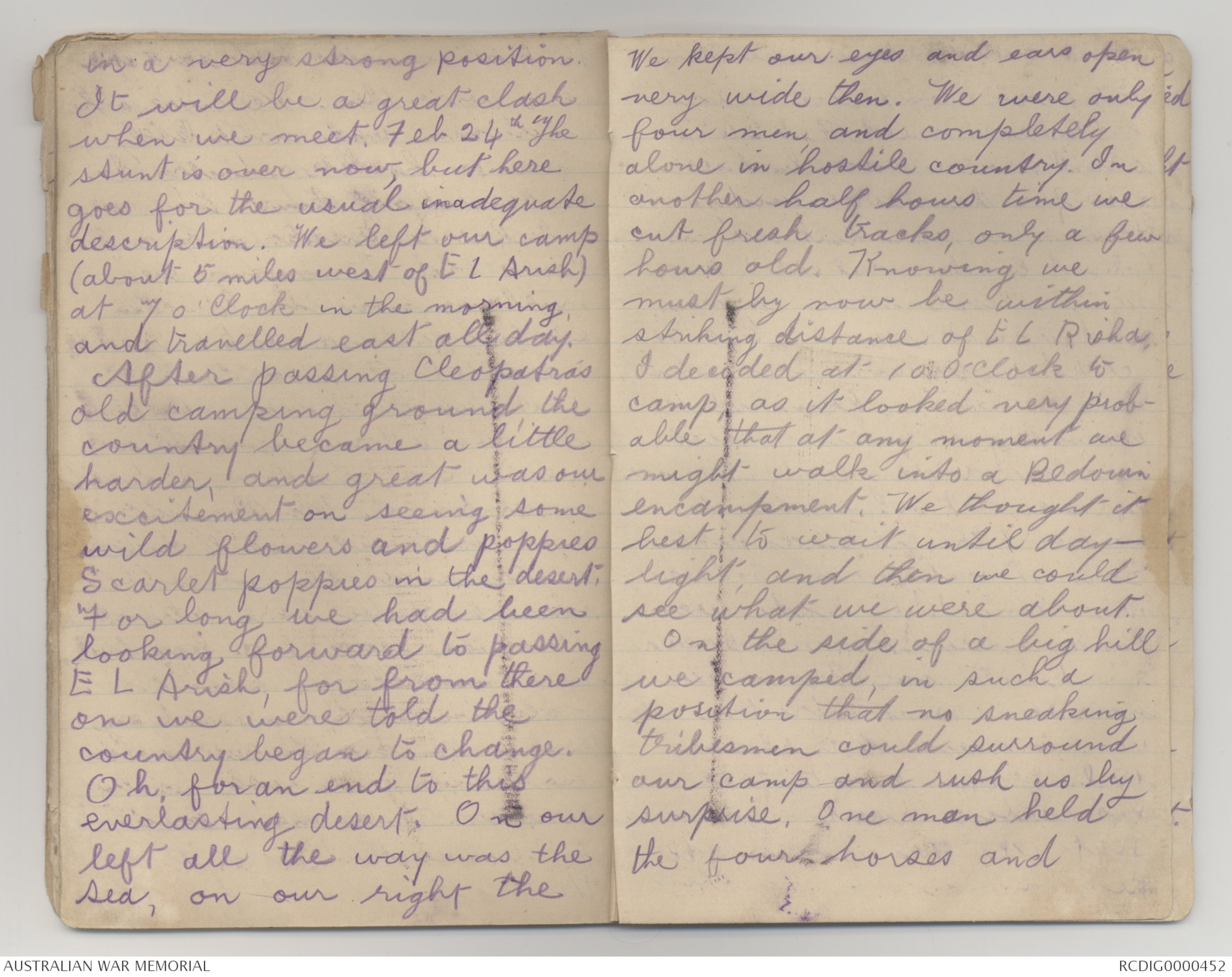
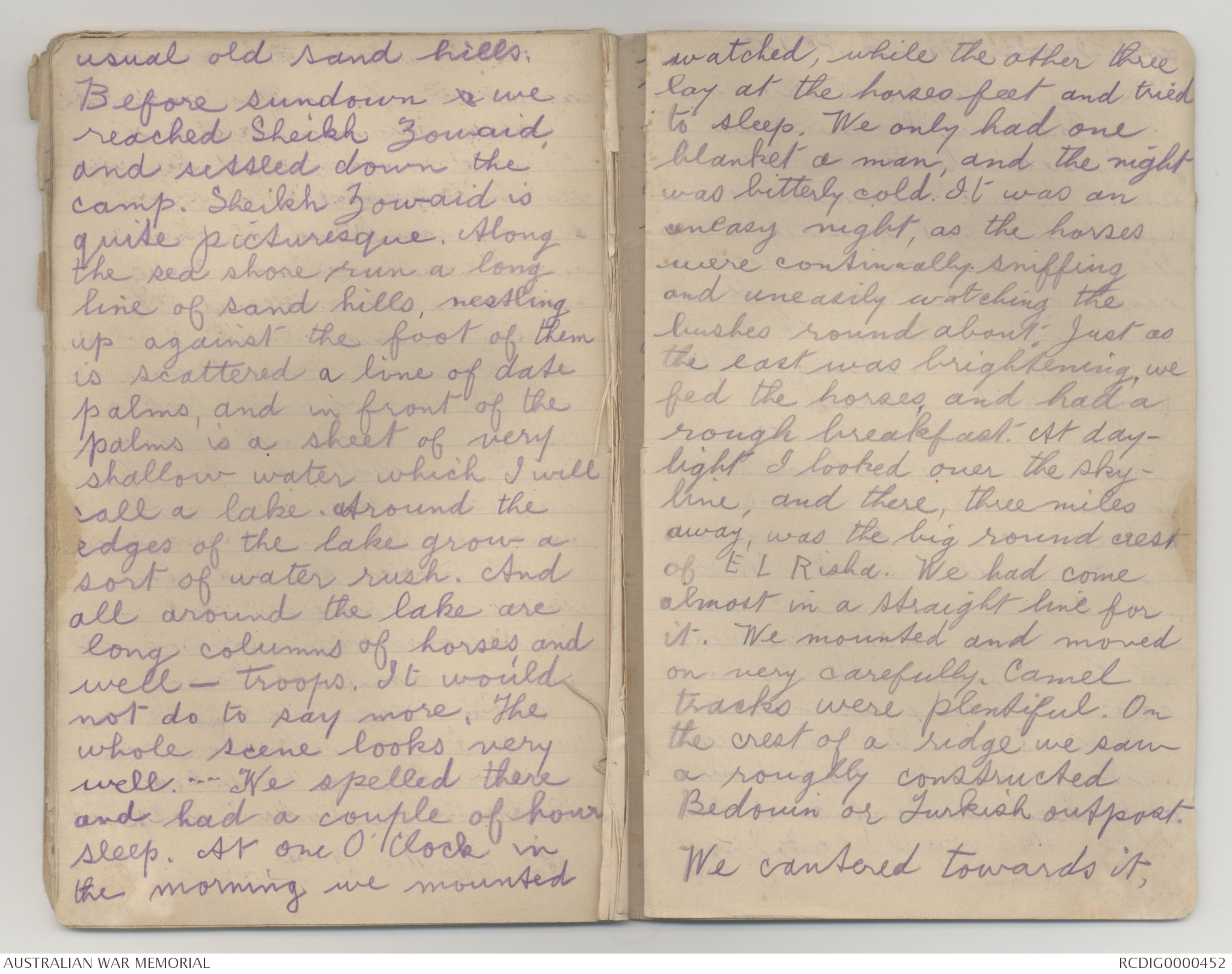
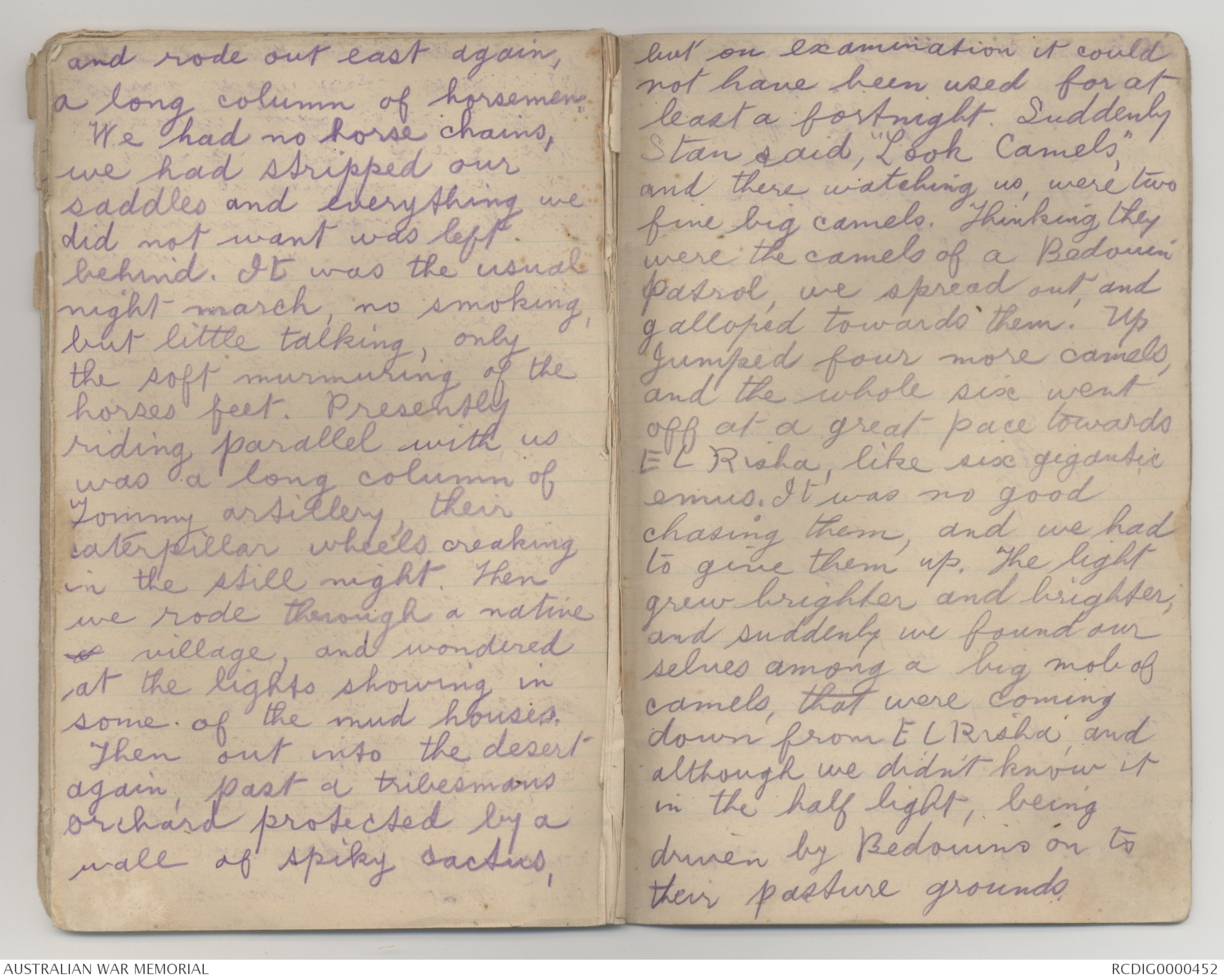
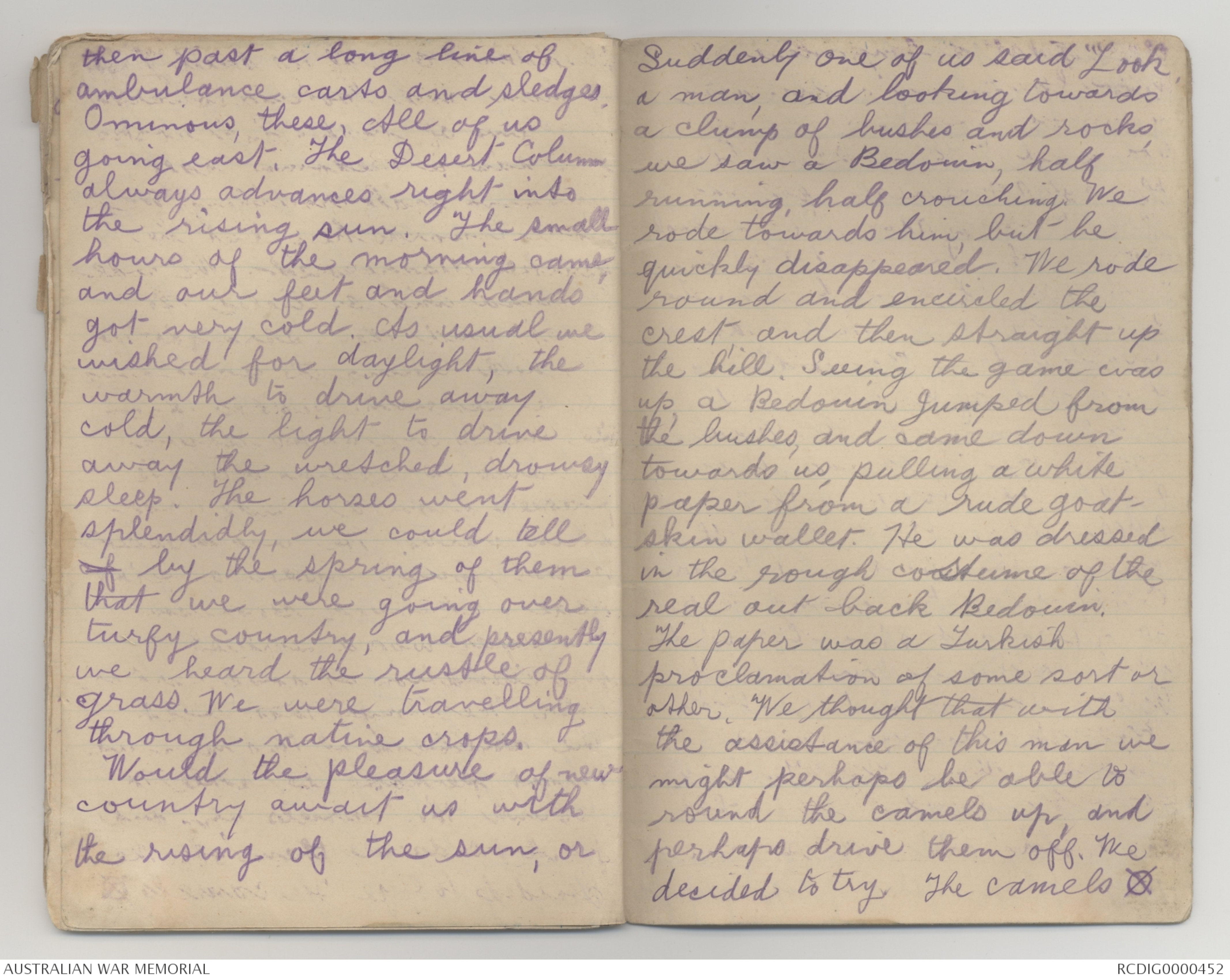
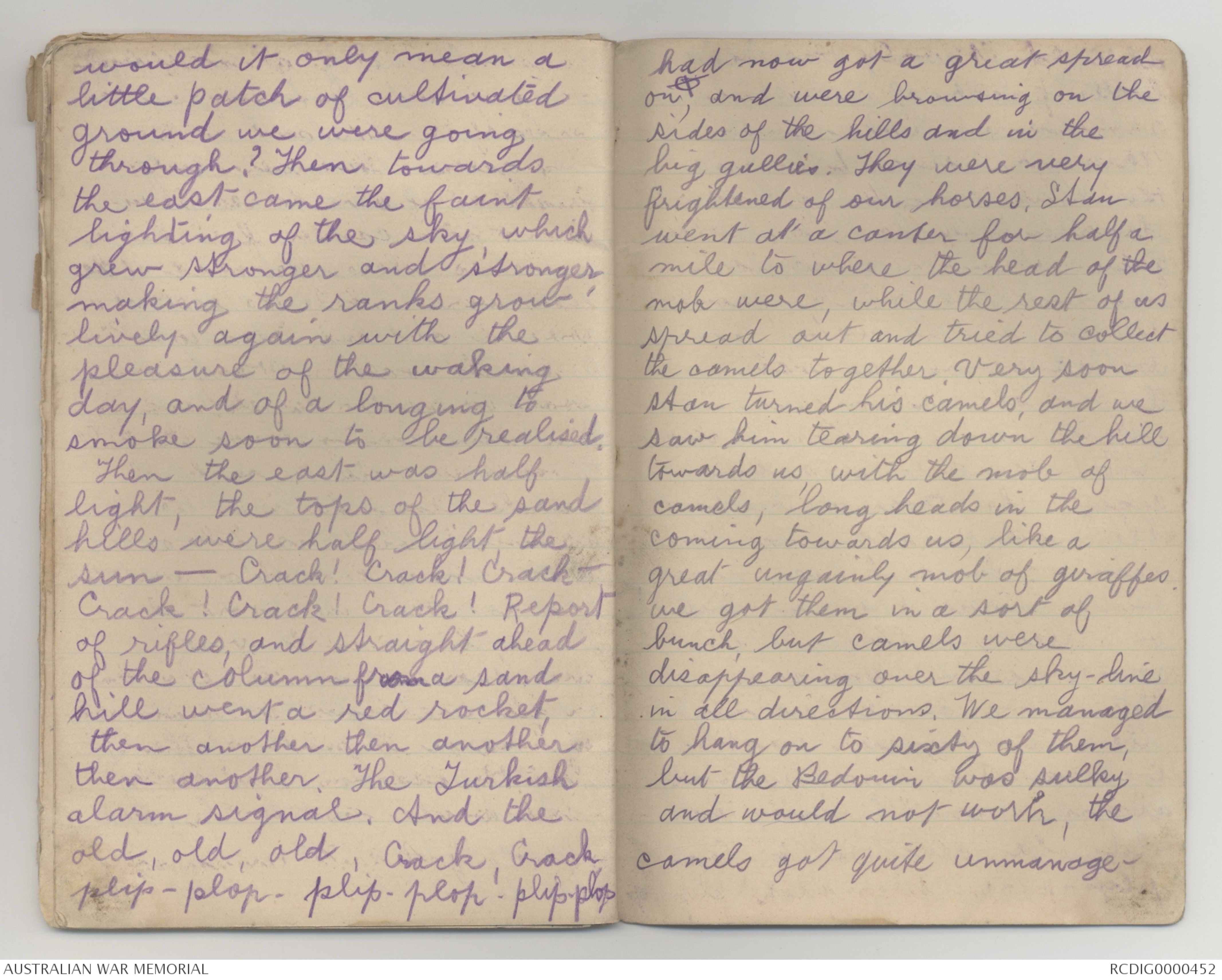
overhead, and straight away
the white puff clouds from
our anti aircraft guns were
floating all around her.
She skedaddled: We are
being issued with tents now.
It's the way of the military.
They've let us go all this time
without tents, and now
when we object very much
to having them they issue
them out. The weather is
good, though a bit squally.
We learn that the Turks
are preparing miles of heavily
fortified trenches for us
about forty miles out. . . . .
The day after. EL Arish is a
string of oasis about five
miles long each oasis mostly
clinging to within a few
hundred yards of the seashore.
Around and
behind these oasis are bare
sand hills, quite bare of O
crouching in the bushes, I drew
the great coat over me and
waited for the blarsted
rain, - and the Turks. The rain
came, a little but not the
Turks. Two such evils on one
night would be almost as
much as a poor lonely outpost
could bear.
29th. We hear more details of
the fight at Maghdaba, away
on the other side of EL Arish
The yeomanry were not in
it at all only the 1st and
third Light Horse Brigade,
and the camel corps. 1350
Turks were captured, 4 mountain
guns, three Krupp guns, and
large stores of rifles, ammunition
and equipment. The
Turks suffered very heavy
casualties, our own
casualties being a little over
100. No doubt it was a X
great win for us. . . 4th Jan
It has been very miserable
[*X*]
ever since Xmas day. Rain
and storms and very
cold winds. The rain is
not very heavy, but it
is beginning to seem
damn near permanent.
At night we leave the
oasis and camp in the
sand hills around. We
dig with our hands in
the sand holes six feet
long and two deep, cover
the wet sand with bushes,
wrap our saddles over
us get in the holes, and
sleep, if we are not on
duty. It is quite cosy in
the sand holes, the wind
blows over the top of us,
and the blankets shield
off the rain a great deal.
The trouble is that now
the blankets have become
soaked through, and we
are very miserable. Some
[*X*]
of us dig a hole wide enough
for two men to sleep in,
sometimes four, and share the
blankets. It is much warmer,
and also takes the rain longer
to work through the doubled
blankets. A strong wind
blows all day and night,
and the clouds come along
like a solid wall of blackness,
reaching right on the
ground. Then the damnedsl cold rain comes, and
the poor devils staring
across the desert on outpost
duty have a damned rotten
time. 9th Jan. We have had our
long wished for scouting trip at
last, but I will write it up from
the beginning. About four days ago
Major Bolingbroke sent for me
and asked if I still had the old
scouting idea in my head. You
can bet I said "Yes" lively. For
O any cove vegetation. In
about the centre of these
oasis is a little cultivated
ground, watered and
tilled by the Bedouins
exactly as it was tilled in
the days of Pharaoh, Opposite
this cultivation, and about
two miles from the sea,
perched on some sand hills
is the historical, scattered
town of EL Arish, holding
about 2,000 inhabitants.
Conspicuous above the town
is the mosque with its fairly
tall minaret. It is the
same town of the story
books and romantic
pictures, only the mud
dwellings are not painted
nice and white, the town
is the color of the desert, and
at a distance hard to see.
Almost all the girls and
women are pregnant with
some time armed Bedouin patrols
have been coming in at night, and
in the dawn been spying on
our observation posts. The major
explained that these Bedouins
came from the ranges somewhere
S.E of our camp, but exactly
where no one knew. It was my
sections duty to go out, and if
possible cut the tracks of these
patrols, and if possible follow
them in towards their camp. If
we could possibly capture a
Bedouin or two, do so or if we
were lucky we might run
across an odd camel. But to
take the greatest care that we
were not cut off and trapped.
The route proposed was a hillm named E.L Reisha, nineteen
miles from camp. No one had
been out there before but it
was known that there was
no water out there. There
were no oasis at all. The
child from the Turkish
soldiers. Feb. 22nd. We are moving
out to morrow, travelling twenty
miles to camp and in all
probability going fifteen miles
further, tackle two or three
Turkish outposts, and then
come back the fifteen miles
to our camp, Sheikh Moaid.
Rather a strenuous programme
for men and horses. Our
orders are now that within
twenty four hours of the
force occupying the camp
all the Bedouins and Arab
tribesmen have to be
collected and sent back.
If a man runs away,
he is to be shot. If men
approach our patrols
without their hands up
or a white flag they are
to be shot. So I can see
the sneaking Bedouin, who
fires when our back is
major leant me map compass and
protractor and together with
Captain Patrick we marked out
the probable course we would
take. Old Morry and Stan
were delighted when I told
them the news, and so was
long Dan Jones. We had only
twenty four hours for the
patrol, as we had very little
hopes of finding water or
horse feed for the horses.
That afternoon the three of
us started out, and made our
course for the big hill. It was
three o'clock when we left the
oasis. After we had gone
about six miles we began to
see the tops of the big ranges
distinctly. Just before it got
dark, from the top of a big
sandhill, we found the
compass pointing direct for
the crest of a very high
turned, getting a lively
time. Evidently the nice kind
benevolent English generals
who are running this show
are at last taking a wake
up to the Bedouin. They are
the best and easiest worked
spies the Turks have. Our
fellows are pretty wild
with the tribesmen. At
Maghdaba one of the L.H
was sent to search a Bedouinb gunyah. His mates found
him a few hours later
between two blankets his
stomach ripped open. But
if I was to keep on writing
of cases like this I'd be
writing until midnight. And
I'm not at all in a writing
mood. But kn now we know
what to do with the Bedouins
The Turks are very heavily
fortifying Shelail. There are
20000 of the beggars there,
hill we could just see some
sixteen miles away. It soon
got dark, and with but an
occasional look at the compass,
we pressed on, going
by our sense of bushmanship
alone. Our great luck was
that the rain had ceased. The
night was clear, but very cold
and the full moon made the
grey old desert very bright.
The sand dunes got higher
and higher, and we found
ourselves steadily climbing.
Now and again we came
on traces of old Bedouin
encampments. The horses were
cold and fresh, and made
very fast travelling. After
each hours riding we gave
them a quarter hours spell.
About nine o'clock we
struck the first fresh tracks,
five camel tracks and
the tracks of naked feet.
in a very strong position.
It will be a great clash
when we meet. Feb. 24th The
stunt is over now, but here
goes for the usual inadequate
description. We left our camp
(about 5 miles west of EL Arish)
at 7 o'clock in the morning
and travelled east all day.
After passing Cleopatra's
old camping ground the
country became a little
harder, and great was our
excitement on seeing some
wild flowers and poppies
Scarlet poppies in the desert.
For long we had been
looking forward to passing
EL Arish, for from there
on we were told the
country began to change.
Oh, for an end to this
everlasting desert. On our
left all the way was the
Sea, on our right the
We kept our eyes and ears open
very wide then. We were only
four men and completely
alone in hostile country. In
another half hours time we
cut fresh tracks, only a few
hours old. Knowing we
must by now be within
striking distance of E.L. Risha,
I decided at 10 0'clock to
camp, as it looked very probable
that at any moment are
might walk into a Bedouin
encampment. We thought it
best, to wait until daylight,
and then we could
see what we were about.
On the side of a big hill
we camped, in such a
position that no sneaking
Tribesmen could surround
our camp and rush us by
surprise. One man held
the four horses and
usual old sand hills.
Before sundown & we
reached Sheikh Zowaid
and settled down the
camp. Sheikh Zowaid is
quite picturesque. Along
the sea shore run a long
line of sand hills, nestling
up against the foot of them
is scattered a line of date
palms, and in front of the
palms is a sheet of very
shallow water which I will
call a lake. Around the
edges of the lake grow a
sort of water rush. And
all around the lake are
long columns of horses, and
well - troops. It would
not do to say more. The
whole scene looks very
well. . . We spelled there
and had a couple of hours
sleep. At one O'Clock in
the morning we mounted
watched, while the other three
lay at the horses feet and tried
to sleep. We only had one
blanket a man, and the night
was bitterly cold. It was an
uneasy night, as the horses
were continually sniffing
and uneasily watching the
bushes round about. Just as
the east was brightening we
fed the horses, and had a
rough breakfast. At daylight
I looked over the skyline,
and there, three miles
away, was the big round crest
of EL Risha. We had come
almost in a straight line for
it. We mounted and moved
on very carefully. Camel
tracks were plentiful. On
the crest of a ridge we saw
a roughly constructed
Bedouin or Turkish outpost.
We cantered towards it,
and rode out east again,
a long column of horsemen
We had no horse chains,
we had stripped our
saddles and everything we
did not want was left
behind. It was the usual
night march, no smoking
but little talking, only
the soft murmuring of the
horses feet. Presently
riding parallel with us
was a long column of
Tommy artillery, their
caterpillar wheels creaking
in the still night. Then
we rode through a native
village, and wondered
at the lights showing in
some of the mud houses.
Then out into the desert
again, past a tribesmans
orchard protected by a
wall of spiky cactus,
but on examination it could
not have been used for at
least a fortnight. Suddenly
Stan said, "Look Camels,"
and there watching us, were two
fine big camels. Thinking they
were the camels of a Bedouin
patrol, we spread out and
galloped towards them. Up
jumped four more camels
and the whole six went
off at a great pace towards
EL Risha, like six gigantic
emus. It was no good
chasing them, and we had
to give them up. The light
grew brighter and brighter,
and suddenly we found our
selves among a big mob of
camels, that were coming
down from EL Risha, and
although we didn't know it
in the half light, being
driven by Bedouins on to
their pasture grounds
then past a long line of
ambulance carts and sledges.
Ominous, these, All of us
going east. The Desert Column
always advances right into
the rising sun. The small
hours of the morning came,
and our feet and hands
got very cold. As usual we
wished for daylight, the
warmth to drive away
cold, the light to drive
away the wretched, drowsy
sleep. The horses went
splendidly, we could tellof by the spring of them
that we were going over
turfy country, and presently
we heard the rustle of
grass. We were travelling
through native crops.
Would the pleasure of new
country await us with
the rising of the sun, or
suddenly one of us said "Look,
a man, and looking towards
a clump of bushes and rocks
we saw a Bedouin, half
running, half crouching. We
rode towards him, but he
quickly disappeared. We rode
round and encircled the
crest and then straight up
the hill. Seeing the game was
up a Bedouin jumped from
the bushes, and came down
towards us, pulling a white
paper from a rude goatskin
wallet. He was dressed
in the rough costume of the
real out back Bedouin.
The paper was a Turkish
proclamation of some sort or
other. We thought that with
the assistance of this man we
might perhaps be able to
round the camels up and
perhaps drive them off. We
decided to try The camels O
would it only mean a
little patch of cultivated
around we were going
through? Then towards
the east came the faint
lighting of the sky which
grew stronger and stronger,
making the ranks grow
lively again with the
pleasure of the waking
day, and of a longing to
smoke soon to be realised.
Then the east was half
light, the toks of the sand
hills were half right the
sun - Crack! Crack! Crack -
Crack! Crack! Crack! Report
of rifles, and straight ahead
of the column from a sand
hill went a red rocket,
then another then another
then another. The Turkish
alarm signal. And the
old, old old, Crack, Crack
plip-plop- plip-plop - plip-plop
had now got a great spread
on 0 and were browsing on the
sides of the hills and in the
beg gullies. They were very
frightened of our horses. Stan
went at a canter for half a
mile to where the head of the
mob were, while the rest of us
spread out and tried to collect
the camels together. Very soon
stan turned his camels, and we
saw him tearing down the hill
towards us with the mob of
camels, long heads in the
coming towards us, like a
great ungainly mob of giraffes.
We got them in a sort of
bunch, but camels were
disappearing over the sky-line
in all directions. We managed
to hang on to sixty of them,
but the Bedouin was sulky
and would not work, the
camels got quite unmanage-
 D Coates
D CoatesThis transcription item is now locked to you for editing. To release the lock either Save your changes or Cancel.
This lock will be automatically released after 60 minutes of inactivity.